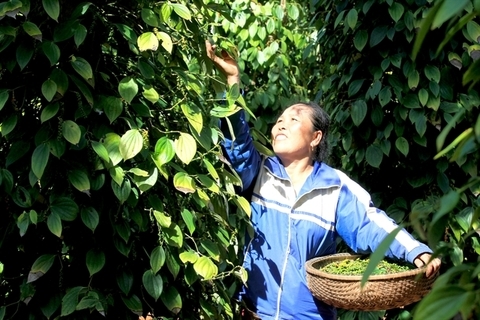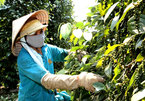 |
|
Harvesting pepper in Quang Tri Province. Viet Nam’s pepper exports in the first six months of this year reached 166,812 tonnes, earning $356 million.
|
The domestic pepper output is expected to fall, creating more difficulties for the country in reaching the export target of 280,000 tonnes with a total value of US$800 million this year.
VPA Chairman Nguyen Nam Hai said the COVID-19 pandemic is seriously affecting global trade and the global pepper supply chain is also interrupted in many markets.
In the first quarter, Viet Nam’s pepper exports remained stable but in the second quarter, the COVID-19 outbreak around the world forced countries and territories to implement lockdowns, leading to restrictions on travel and trade activities.
In addition, consumers also cut spending on non-essential products to focus on essential food and health products, causing significant reductions in pepper import demand.
In the first six months, Viet Nam’s pepper exports to China decreased by 21.4 per cent and to India 37.8 per cent.
Especially, Vietnamese pepper exports to Nepal increased sharply in the first quarter but from the end of March, the Nepalese government temporarily suspended imports of some commodities, including pepper, meaning local export enterprises faced difficulties in exporting to this market.
The General Department of Customs reported that Viet Nam’s pepper exports in the first six months of this year reached 166,812 tonnes, earning $356 million, down 5.7 per cent in volume and 21.1 per cent in value over the same period last year.
Of which, the exports in June reached only 21,000 tonnes, a sharp decline of 32 per cent year on year.
Hai said with the developments of COVID-19, the import demand for Vietnamese pepper in some large markets such as India, the US and the EU is expected to continuously decrease.
In addition, climate change and low pepper prices have led to a reduction in pepper output. Viet Nam's total pepper output in 2020 is expected to reach only 240,000 tonnes, down 15 per cent compared to 2019.
This factor will also make it difficult for Viet Nam to reach its export target this year, Hai said.
Tran Phuoc Hau, deputy general director of the Tran Chau Import and Export Company, said that the company's two largest export markets are Europe and the US, in addition to some Asian and Middle Eastern countries.
However, due to COVID-19, its pepper exports have decreased significantly since the beginning of March. In addition to the continuous fluctuation of raw pepper prices, most businesses can only export pepper under old export contracts and do not have new export orders.
Therefore, the association has recommended that the local export enterprises should focus on restoring pepper exports to markets which have lifted lockdowns in Asia, such as China, South Korea and Japan. At the same time, they need to boost domestic consumption with processed pepper products.
Viet Nam’s pepper farmers need to link with export enterprises in expanding areas for organic pepper trees. That would ensure Vietnamese pepper has stable output and higher quality to compete with pepper from Brazil and Indonesia. These two countries producing pepper are expected to have high output of pepper in the next crop, putting more pressure on the price of Vietnamese pepper. — VNS

VN Trade Ministry rescues 58 containers of pepper stuck in Nepal
Upon receiving information regarding 58 containers stuck in Nepal and India, Minister of Industry and Trade Tran Tuan Anh signed a letter to the Minister of Industry, Commerce and Supplies of Nepal to request support for Vietnamese businesses.

Pepper prices become unstable due to faulty information
Pepper prices unexpectedly fluctuated on confusing information, placing difficulties for export.